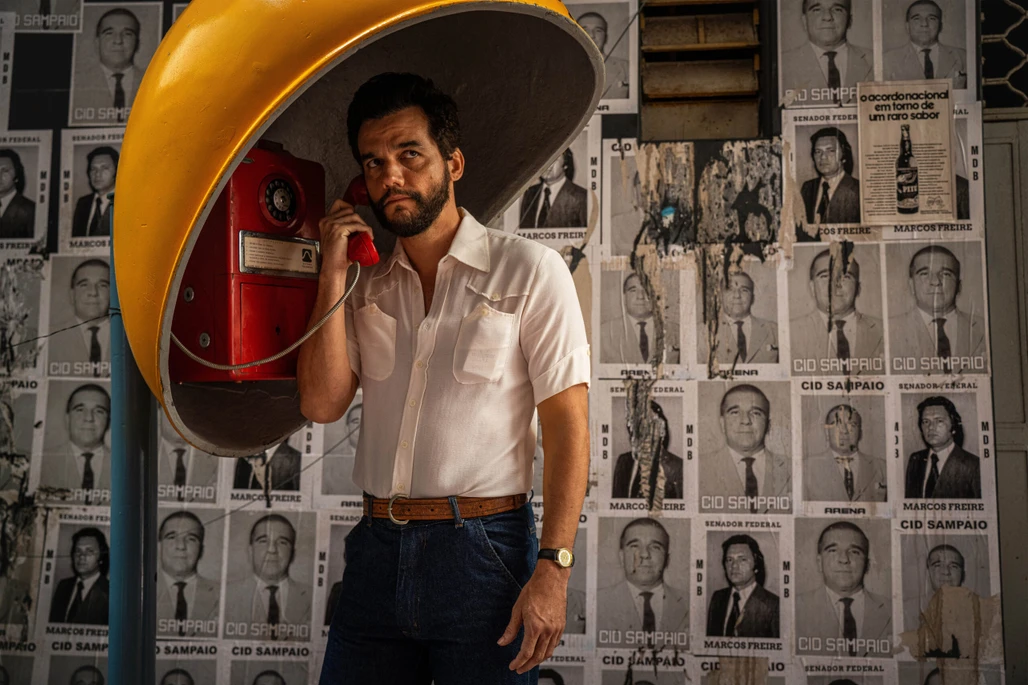O Agente Secreto – People Before Google | Cannes 2025
In 1970s Brazil, a country under military dictatorship, a teacher tries to clear his name and start over. “O Agente Secreto”, Kleber Mendonça Filho’s spectacular new project, dives into this delirious social landscape – halfway between unending Saturnalia and omnipresent terror – to deliver a fresh cocktail of cinephile nostalgia and thrills.
O Agente Secreto is a treat for those who’ve long waited for a film clever enough not to slip into cheap pastiche, hedonistic enough not to deny itself the pleasure of storytelling, and costly enough, as a historical film, to make no compromises when it comes to the abundance of artefacts. In other words, it’s an ideal middle ground: conciliatory, generous, and “total.” If anyone today is capable of making such a film, it’s Kleber Mendonça Filho. From his early shorts, gloriously followed by the features Neighbouring Sounds (2012) and Aquarius (2016), he has established himself as a great cinephile craftsman. Serge Daney once wrote, “Arriving in extremis, almost too late, pretending to hope the feast is still going on, is probably the essence of what we call ‘cinephilia’.”
That’s precisely Kleber: a filmmaker who has known cinema in all its glory (he started out as a film critic) and who, even knowing it no longer exists – at least not in that form – continues to pursue it at a loss, chasing one last sublime high. The process is artificial and somewhat regressive, but given his talent, we can understand. He has an immense ability to work with the material and the grammar of film, and is knowledgeable enough not to fall into nostalgia or imitation. Less formalist or experimental than Miguel Gomes, the other Lusophone filmmaker born under the sign of cinema’s end, he also appears less sceptical of the power of classic storytelling – hence the impression that O Agente Secreto is both a masterclass in high art and a heartfelt siren song from a dying craft. It’s a kind of perfect exercise – perfect in the roundness of its story, even in what it hides right before wrapping up with an apt flourish – carried out by this “Nadia Comăneci of directing” (to quote a poster seen in the film) that is Kleber.
In his previous title, Pictures of Ghosts (2023), a documentary about the city and house he grew up in, Kleber invented – from the well-worn format of the personal archive documentary – a fabulous personal cosmogony where cinema played the role of a guiding star. Like a more melancholic and gentler Tarantino, he cheekily took us through his gallery of stars – era-defining celebrities who once roamed great movie palaces now in ruins, vivid memories of projectionists sweating in their booths – while at the same time playing the elegiac film of a bygone world. Driving his affective montage was a lifelong mania: an unwavering faith in a hyper-democratic form of expression, now obsolete. That’s when it became clear: Kleber is a man of newspapers, film reels, and phone booths – not out of fetishism, but from conviction. “People from before Google,” that’s how one character in the film’s contemporary frame describes the 1970s protagonists of O Agente Secreto, as if the filmmaker were simultaneously justifying this journey into the past and acknowledging their greater dose of reality compared to our here-and-now of laptops, smartphones, and other deeply uncinematic devices.

Just like Bacurau, his 2019 feature co-directed with Juliano Dornelles, this new film is also a blend where politics is filtered through the taming lens of genre, of fiction, of local colour. The filmmaker drizzles his obsessions within a formally conventional framework. The protagonist, Armando (Wagner Moura), returns to Recife (the privileged locus of Kleber’s filmography), where the memory of many loved ones lost in the meantime awaits him, along with a present life lived in hiding. Soon enough, the James Bond-like trail suggested by the title crystallises around a conflict with an industrialist who has it in for the university department led by Armando – so much so that, without revealing the full intrigue, we see him hire two hitmen to deal with the professor. This thriller skeleton – hovering between deconstruction and homage – is more than just a pretext: with its sharp eye on the documentary fibre of the city, O Agente Secreto is idiosyncratic, yet flirts with a very real fascination for the opaque, “transcendental” violence of the social context.
At the same time, set during a carnival, the film is itself a carnival of Easter eggs, lavishly scattered across the mise-en-scène. From a two-headed cat to Udo Kier appearing as a Jewish man mutilated during the war, to a brief Z-movie sequence in which a disembodied leg – nothing but raw, bruised flesh – terrorizes clusters of lovers in a park, O Agente Secreto is pulsating (you’d think you could inhabit its vibrant images as if they were some kind of secret chambers) and richly textured – a constant surprise. Opening with a textbook tense scene (Armando, about whom we know nothing but suspect a lot, is stopped by a patrol of corrupt policemen), the film ends, after many twists and turns, with a vigorous climax à la Brian De Palma in which targets and assassins lose each other in crowded streets. Extras (the credits mention over a thousand), vintage cars, and set designs so well-chosen they seduce the eye without drawing undue attention – all contribute this ever-moving period image, aware that if it freezes even for a moment, it reveals itself as fabricated, a pose, devoid of magic. The frames throb with tired, greasy faces, with non-actor bodies unfamiliar to the camera, with hobbling gaits, bulging bellies, and toothless mouths; they uncover spaces that seem to radiate existential heat, an eternal state of decay; they turn the street into spectacle and every action into a chain of paradoxical micro-actions. No matter how much money the production gathered – and it seems there was quite a bit – the film could never have replicated this sensory richness. It is undoubtedly the fruit of a temperament that seeks truth, not mere verisimilitude, and the unifying force of storytelling, not some aesthetic veneer. And these things are hard to fake.

When the professor meets the team assigned to protect him in a shabby cinema – his father works there as a projectionist – the camera lingers briefly on the faces of the stars on screen, yet the connection to Pictures of Ghosts and Kleber’s own life is already in play. Still, the film is not merely a string of arbitrary whims: it breathes life into this strictly autobiographical reference, transforming it into a marker of an era. The fact that Jaws (1975) was playing in cinemas at the time, sparking great excitement in the professor’s son, allows Kleber’s cinephile sensibility to open a unique window into this temporal rift. Filtering everything through his own lens, the filmmaker does the work of a historian: he connects the events with a red thread that leads to a real, visceral memory – one that bursts forth in moments of danger, as Walter Benjamin once said. At times, the mise-en-scène is so intense that by the time we reach the epilogue and return to the present, with the camera filming a car driving off from a medium height, I could have sworn the GPS “fin” on its roof, lingering in the foreground, was actually a shark’s dorsal fin.
I enjoyed the unparalleled puppeteering displayed here, as I have with each of Kleber’s films, which have opened up new, thrilling hypotheses about this tangle of images and sounds called cinema. And yet, following a trend I’ve been noticing (in myself), I couldn’t shake a feeling of futility and even boredom in front of this very decent, refined proposal, with incarnated characters and branching events. The world it recreates – a naturalism strained with supernatural hints – is fabulously ambitious, but the film can’t hide forever a certain disconnect from the now: this “now” drowning in money, lumbering production mechanisms, and over-manicured screenplays. Its craftsmanship is as seductive as it is anachronistic: O Agente Secreto is undeniably a time capsule – but not just in the sense the narrative aims for. It also reveals a bygone cinematic age, one we have no reason to mourn. But perhaps this interpretation says more about the fluctuations of my own cinephile sensibility than about the film itself.
O agente secreto premiered at Cannes 2025.
Title
O agente secreto
Director/ Screenwriter
Kleber Mendonça Filho
Actors
Wagner Moura, Maria Fernanda Candido, Alice Carvalho
Country
Brazilia, Franța, Olanda, Germania
Year
2025
Film critic and journalist; writes regularly for Dilema Veche and Scena9. Doing a MA film theory programme in Paris.


